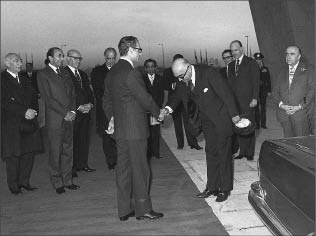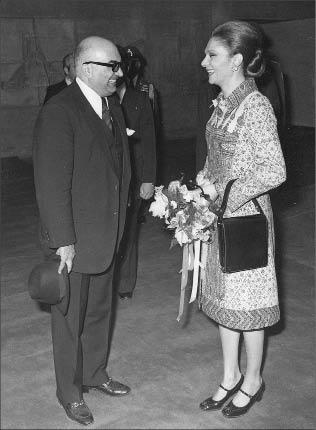The Shah's Non-
Command Performance

For a brief time in the 1970s, even as an exiled Ruhollah Khomeini dreamed of revolution, the Shah of Iran was intent on making his nation look like a world leader. It was nothing less than a makeover on a monstrous scale, greased by abundant petrodollars. And opera was to be the centrepiece of his ambitious arts program.
As a native son, I was pressed into service to make an opera tradition for Iran. Note that I say “make” as opposed to “build.” In Iran at the time, money was used as a magic wand to make things appear — poof! — rather than to develop them logically. It started with a production of Carmen, which was part of nationwide celebration of the 2,500th anniversary of Iran. The number 2,500 did not really mean anything, since Iran has been in existence for over 4,000 years. It was only a pretext for the Shah to hold a colossal festival and to proclaim himself and his wife, Farah Diba, emperor and empress. Just like Napoleon and Josephine.
For the five years that followed I brought the best of the European tradition to Tehran’s new and sumptuous Opera House, including Verdi’s Aida and Falstaff, and a double bill of Bartók’s Bluebeard’s Castle and Ravel’s L’Heure Espagnole. The casts were hardly second rate, featuring major stars like Tito Gobbi, Beverly Sills, and Giuseppe Taddei.

Lotfi meeting the Shah of Iran.
The Opera House was confounding. On the one hand, it was a dream of a building. Designed by Fritz Bornemann, the German architect who had built the Berlin Opera House, it had everything: modern rigging and lighting, spacious backstage areas, a breathtaking foyer, mosaics, chandeliers, lush gardens. On the other hand, unbelievable intrigue and petty politics coursed through its halls, with everyone working overtime to sabotage everyone else. It was always a great relief to close a production in Tehran and return to my work in Europe.
In 1973 I directed The Tales of Hoffmann in a huge production that ended up being a smashing success, then retreated back home to Geneva. A few months later I got a call from Iran’s minister of culture, demanding a command performance of Hoffmann as part of the Shah’s birthday celebration. Just one performance. Unbelievably, the happy occasion was but ten days away.

With Queen Farah Diba in Tehran.
Normally it takes months to pull together a major production and I had days — no, hours! I don’t think I’ve ever made so many phone calls in such a short time. Pulling out my little black book, I started calling agents. The great singers, however, are booked years in advance — Plácido Domingo, among others, simply wasn’t available. Finally, I managed to put together a decent cast, but that was just the beginning of the challenge. Flights had to be booked, bags packed, visas obtained, hotel rooms reserved. Unnervingly, I spent far too much of my first few precious days just getting everyone on the same page — literally. Hoffmann is one of those operas that has several different performance editions. A scene in one edition might be omitted from the next. Even the order of the acts can differ. And, unfortunately for me, I had created a unique version of my own. Orienting my singers turned into an Abbott and Costello routine: who’s on first, what’s on second, I don’t know is on third.
By the time we all finally assembled in Tehran, only a little more than forty-eight hours remained on the clock. This period exists as nothing more than a blur in my memory. Singers ran from costume fittings to coaching rooms to the stage and back. The orchestra players frantically rehearsed the score. Sets were hammered together and run through their technical paces.
At other opera companies I was accustomed to careful budgeting and watching every penny, but in Tehran I didn’t have any limitations — and in this instance, I was glad for that. This was a major production, and getting things done on time meant money had to be spent — and so it was, by the bucketful. Riding high on adrenaline, we worked at a fever pitch, getting by on only the occasional stolen hour of sleep. Despite everything, we felt proud that our effort was at least going to be respectable.
On the day of the performance I received a call from the Minister of Culture: “The schedule has been changed. We’ve decided we don’t have time for an opera. Tell everyone that they will be paid as agreed, but that we no longer require their services.”
Instead of performing we were invited to a lavish banquet of vodka, champagne, caviar, pheasant, and truffles. The cast couldn’t believe what was happening. They had been flown first-class from all points of Europe, put up in the best hotel in town, and wined and dined at an exquisite party. The next day each one would fly home, again comfortably seated in first-class, with pockets stuffed with cash — plus one kilo of the finest Caspian Sea caviar, worth about $3,000 at the time. And they did not sing so much as a single note!